- Home
- Richard Lee Byers
The Haunted Lands: Book III - Unholy Page 26
The Haunted Lands: Book III - Unholy Read online
Page 26
Aoth looked around. None of his allies appeared to notice that Szass Tam was trying to engage him in conversation. Not even Jet, despite their mental link.
“I made what’s happening seem inconsequential.” The necromancer looked at his left hand. The rings vanished from his shriveled fingers, and others appeared a moment later. Evidently he was arming himself for battle. “The enchantment would fail if I tried to strike someone dead or attempted some other violent action, but it should enable us to have a private chat.”
Aoth took a breath. “Frankly, Your Omnipotence, I can’t imagine what you think we have to ‘chat’ about. You want to kill everyone, including me. At the moment, circumstances may require us to fight on the same side, but that doesn’t mean I’ve forgotten.”
Szass Tam sighed, and Aoth smelled a hint of old decay on the lich’s breath. “Plainly, Captain, something prolonged your life. Otherwise, you wouldn’t be here.”
“The blue fire. Turns out it did more than just sharpen my eyes.”
“Ah. Well, if you live as long as Malark and I have, you may come to see what a shabby, unsatisfactory place the world truly is.” Szass Tam summoned a silver wand into his hand, considered it, and made it disappear again. “Nothing here is worth preserving, and that includes your current existence and mine. They’re shot through with misery, and they’re going to end in a little while regardless. Would you scruple to demolish a wretched hovel if you could erect a palace where it stood?”
Aoth snorted. “You can talk all you want about creating a better world, but to me, it looks like what you really crave is to be a god.”
“Well, the two goals weren’t mutually exclusive.” Bracers made of intricately carved bone shimmered into existence on Szass Tam’s wrists. “Sadly, however, they have both become unattainable.”
“How so?”
“You’re a warmage, but I’m sure you know enough about other forms of sorcery to grasp the principle that one must perform great rituals on prepared and purified ground. And that if the magic fails, the wizard must rededicate the circle before trying again.”
“Right. I do know that.”
“Well, the Unmaking is more powerful by many orders of magnitude than any other ceremony ever conceived, and thus its requirements are even more stringent. If you begin it and something stops you from finishing—as we intend to stop Malark—then no one can ever perform it in that place. It’s not possible to dedicate the site a second time.”
Aoth studied the lich through narrowed eyes. “And the ‘site’ is Thay itself? Because the circle defined by the Dread Rings takes in most of the realm?”
Szass Tam inclined his head. “Exactly. So you see, you no longer have to worry about me wiping you and the rest of the East from existence, and you may want to reconsider your allegiance.”
Aoth opened his mouth to scorn the suggestion. But then something made him ask, “Why?” instead.
“Isn’t it obvious? You deserted from the council’s army and took your griffon riders with you. You were actually going to attack the Wizard’s Reach at Aglarond’s behest until word of my intentions persuaded you to change your plans. You then made common cause with the zulkirs and found you had to demand they treat you as an equal to have any hope of succeeding at your own objectives.”
The regent replaced his blackwood staff with one that looked made of the same insubstantial shadowstuff as Mirror. Unlike the solid staff, it didn’t tap or thump when the butt came in contact with the floor. “They won’t stand for such ‘treason’ and ‘insolence,’ Captain. They wouldn’t stand for the tenth part of it. They mean to kill you when this is over. If you ever learned to know them at all—or simply caught the look in Nevron’s eyes when you dared lay hands on him—you must realize I’m speaking the truth.”
From the start, Aoth had feared the zulkirs would ultimately turn on him, but he had seen no choice but to ally with them even so. “Whereas you, on the other hand, were never one to hold a grudge.”
Szass Tam chuckled. “You have me there. I’ve taken my share of revenge. It’s satisfying and one of the means by which a person gains and holds power. Yet I think you have a sense that I’m not so petty as these others. I can forgive when it serves my purposes and when a foe has won my respect. Malark is a case in point. He balked me for ten years before switching sides, and I could have punished him after I finally took southern Thay. Instead, I gave him my friendship and raised him high.”
“I don’t want to be a lord in Thay. I’m happy leading the Brotherhood of the Griffon.”
“Then heed me now. I overheard what you whispered to Anskuld, and you’re right. Assuming we all survive our clash with Malark, the council will then strike to destroy me. Stand with me, and I’ll see to it that you return to your sellswords safely, with enough gold to make every one of them rich. Side with Nevron and the others, and I guarantee that even if I don’t kill you, one of them eventually will.”
The wind blew out of the east, which meant it was blowing straight in the faces of the advancing soldiers. At first, it was only an annoyance, but it gained strength by the moment and in so doing, picked up stinging, blinding, choking dust.
That last proved magic had raised the gale, not that Chumed Shapret had doubted it before. Generally speaking, Thay was a dry country, but the past few tendays had seen a fair amount of rain. The ground was too muddy for even a powerful wind to strip away so much soil.
A seasoned campaigner, Chumed had long ago learned to carry a kerchief in his saddlebag for situations such as this. He knotted it around the lower half of his face, wished he had a way to keep flying grit out of his eyes as well, turned his destrier, and cantered in search of So-Kehur.
Scuttling along in the vanguard in the form of a huge steel scorpion, the autharch wasn’t difficult to locate, even with the streaming brown haze in the air. “Master!” Chumed called.
So-Kehur turned to regard him with the opalescent eyes set in his mask of a face and with others that waved around on tendrils. Chumed suppressed a grimace of distaste. He never liked it when the autharch donned a body with features intended to suggest the essential humanity of what was inside. He suspected that in truth, the grotesque circumstances of So-Kehur’s existence had long ago altered him into a being as alien as any devil or ghoul.
“What is it?” So-Kehur asked.
“The enemy raised this wind,” Chumed answered.
“Well, obviously. But don’t worry. They can’t keep it up for long. Especially since I have our own wizards working to quell it.”
“That’s good to hear. But until they succeed, perhaps we ought to hold our position.”
The metal mask didn’t change expression, but Chumed could feel his master’s displeasure gather like the threat of a storm in the air. Because of his psychic abilities, So-Kehur’s emotions were often directly perceptible to others. “That’s a bad idea,” the autharch said. “The invaders may be trying to slow us down so they can slip away.”
“With all respect, Milord, they have nowhere to go. Their backs are to the Lapendrar. The river’s high, and they have no boats.”
“But if we give them time, they might still find a way to cross. Remember, their leaders are zulkirs, with all the power that implies.”
Chumed had by no means forgotten, but to him the fact suggested a need for caution, not for haste. Unfortunately, So-Kehur’s ambition to prove himself a master general was coloring his judgment.
That meant it would likely be pointless to argue any further. So-Kehur might even sear Chumed’s mind with a burst of psychic fire if he tried. So he simply bowed his head and said, “As you command.”
The army trudged onward. The wind howled. Horses neighed in protest, soldiers coughed and complained, and their sergeants and officers bellowed at them to keep moving. When the first screams sounded, Chumed wasn’t sure he’d actually heard them over the general din.
The next moment resolved his uncertainty.
Hitherto concealed by the
blowing dust and the blur of tears in everyone’s eyes, demons abruptly scuttled into view. Big as ogres, armored in chitin and spikes and possessed of enormous pincers, they looked vaguely like huge crabs, and they tore into the front ranks of the marching columns with appalling speed. Their claws nipped men in two. Their horns slashed and pierced.
Chumed was a soldier, not a wizard, but he’d read a book or two concerning demons in the hope of knowing what he was facing when an enemy mage conjured entities like these onto the battlefield. Thus, he recognized the attacking brutes as nashrou. “You can kill them!” he shouted. “Strike for the gaps in their armor!”
He then cast about and saw that it didn’t look as though anyone had heard him. Everything was too noisy and confused.
He cursed. He was no more eager to venture within reach of one of the demons than any of the wretches they were currently tearing apart, but apparently someone needed to demonstrate how to kill them, and sooner rather than later if he hoped to avert a panic.
Off to his right, a nashrou fought a company of blood orcs. The soldiers were game. Roaring their deafening battle cries, they stood their ground and hacked savagely but to no avail. The demon was still ripping them apart.
Chumed couched his lance and spurred his mount into a charge. His steed was a pure-blood horse, not one of the unnatural hybrids many Thayan warriors preferred, but it raced at their hideous target without hesitation.
He wondered if he’d have to knock orcs aside or even trample them to reach the nashrou, but they sensed him coming and scrambled out of his way. Unfortunately, the crab-thing noticed him too, and its four legs scurrying, rushed to meet him. A set of pincers spread wide, then shot forward.
His lance, however, was a little longer than the nashrou’s limb. It struck first, and punched deep into the fissure between two plates of chitin.
The claw plunged down an instant later. He shifted his shield to block, and the pincers snapped shut on the edges. The metal groaned and buckled.
But it didn’t crumple completely, because at that point, the nashrou’s legs gave way, and it fell. Its grip on the shield nearly yanked Chumed out of the saddle, but then the armor jerked free.
Chumed studied the motionless creature, trying to make sure it truly was dead. It looked like it to him, and judging from the cacophonous cheers of the surviving orcs, they thought so too.
He tried to pull his lance out of the carcass, but it was stuck fast. He let go of the butt and raised his hand to quiet the orcs. “Strike for the cracks in the shell!” he told them.
They did and killed another nashrou. Other people had evidently figured out how to do it too, for the crab-things were dropping one by one. Crawling and clinging, nearly burying it beneath their bodies, zombies swarmed on one of the demons like ants and stabbed it repeatedly with their blades. A Red Wizard blasted another apart with a single stroke of lightning.
It wasn’t too bad, Chumed decided. They hadn’t lost too many men, and only a few legionnaires had run. Winning this first skirmish might actually bolster everyone’s confidence. And at least the damn wind was dying down.
Then cries rang out behind him.
Several dark, horned giants with batlike wings—devils called malebranches—were diving down out of the sky. Everyone had been too intent on the nashrou to see them coming.
They thumped down among the enclosed wagons. All those conveyances had guards, but they floundered back in terror. The malebranches jabbed at the wagons with their iron tridents, breaking them open as if they were made of eggshells.
It was a typical gray Thayan afternoon, the sky veiled with clouds, smoke, and ash. But enough sunlight filtered down to burn the entities riding in the wagons. One of the carriages rocked back and forth as the thing inside screamed and thrashed in its final agonies.
As soon as a malebranche finished with one wagon, it turned its attention to another. From Chumed’s vantage point, it looked as if they had smashed open ten or twelve before the wizards finally took effective action. Then, one by one, the devils froze in place and vanished as magic hurled them back to their native plane of existence.
Chumed rode toward the spot where So-Kehur’s steel form gleamed above the heads of his followers. When he got close, he saw that the autharch stood over the corpse of a nashrou like a self-satisfied hunter preening over the body of his kill. He’d evidently played an active part in the fighting, and not just with his sorcery and psychic talents. Spatters of ichor mottled his claws and stinger.
“Well,” said So-Kehur, “that went well enough.”
“I suppose you could say that,” Chumed answered. “We did deal with the demons as efficiently as we had any right to expect. Considering that the dust kept us from seeing them until they were already on top of us.”
Chumed regretted the words as soon as they left his mouth. But if So-Kehur even heard the implied criticism, combat had left him too exhilarated to make an issue of it. “How long to get the columns moving again?” the autharch asked.
“Not too long. The healers have to tend the wounded, and everyone needs a chance to catch his breath.”
“Well, take care of it all as quickly as you can. I want to reach the battlefield by nightfall.”
I don’t, Chumed thought. Not especially.
It wasn’t that he was afraid. He was no coward, and the army they were about to engage had all but crippled itself taking the huge fortress in the northern part of the tharch. But, So-Kehur’s bloodlust aside, he still didn’t see any compelling reason for this fight, and what was even worse was that the enemy had just demonstrated they could outthink the autharch. Chumed recognized it even if his master didn’t.
The round, flat roof of the keep provided a view of the city surrounding the Citadel and the mountains beyond. Columns of smoke rose from some of the latter, and a cold wind blew them toward the bloody sunset.
Bareris looked for some indication that Szass Tam had cast potent enchantments on this place. He didn’t see any. But both Aoth and Mirror faltered when they came up the stairs. Apparently the warmage’s spellscarred eyes could discern the truth, and the ghost perceived the same “unholy” malignancy to which he’d reacted before.
Szass Tam walked to the center of the rooftop, turned, and gave them all a smile that jabbed a fresh spasm of loathing into Bareris’s guts. He stifled the feeling as best he could.
“Well, here we are,” said the lich. “Nothing remains but to unlock the door. So if you want to enhance your defenses or anything like that, now’s the time.”
“So it really is going to be just us,” said Samas Kul, his tone petulant. “Even though you have an entire army garrisoned here.”
“He already explained,” Lallara said. “Springhill is in control of the realm beyond the gate. Since he created the place, Szass Tam can take us through even so, but we’re about the limit. Any more and we’d simply lose people, much as we lost them translating ourselves into the dungeons. Now, if we could be certain of losing you—”
“I understand!” the obese transmuter snapped. “I’m just amazed that a would-be god can’t do a little better.”
“Perhaps the years have sapped my powers,” Szass Tam said. “I suspect that the next little while will give you ample opportunity to judge.”
“Before we go in,” said Aoth, his fingers scratching amid the feathers on Jet’s neck, “I need to be clear on one thing. Is it enough to interrupt Malark? If we knock the breath out of him in the middle of an incantation, will that stop the Unmaking?”
“Unfortunately, no,” Szass Tam replied. “The ceremony involves a number of conditions and limitations, but that isn’t one of them. He can pause, deal with an interruption, and then pick up where he left off.”
“So we have to kill him,” Nevron growled. “Fine. We all want to kill him. Let’s get on with it.”
“As you wish,” Szass Tam said. He turned his back on them; Bareris shivered and clamped down on the urge to strike while the lich looked vulnerable.<
br />
Szass Tam flourished his shadowy staff and whispered words that somehow made Bareris angrier still, that seemed to feed the hate and bitterness inside him like dry wood feeding a fire. Then a square of utter blackness, big as the entry to a rich man’s house, painted itself on the air.
Bareris assumed that they’d walk into it. Instead, it rushed forward, expanding as it came, first swallowing Szass Tam and then himself. And all the others too, presumably, although at that instant, he lost sight of them. He seemed to tumble through freezing darkness, then jolt down on his feet. A new world oozed into view.
It was a place of towering crags and twisting canyons, without even a sprig of brush or speck of fungus growing anywhere on the dry earth and stone. Only a handful of faint stars gleamed in the black, moonless sky.
He and his companions had arrived in one of the gorges. The others pivoted, peering around. “I assumed,” Lauzoril said, “that you’d shift us into position to attack Springhill immediately.”
“It wasn’t possible,” Szass Tam said. “He has layers of protection. I couldn’t pierce them all with a single spell.”
“But now that we’re here?” Samas asked.
“I hope so.” Turning, the lich studied the peaks and cliffs, then chuckled.
“What?” Nevron spat.
“Malark’s altered the geography,” Szass Tam said. “Either to disorient me if I escaped Thakorsil’s Seat and came after him or simply because he finds the new skyline more conducive to focusing his thoughts.”
Either way, Bareris didn’t like hearing that their foe had shifted mountains like a child playing with blocks. Szass Tam had warned that Malark was a god in this realm, and that didn’t seem like hyperbole anymore.
“So I take it we have to find him,” Lallara said. “I can cast a divination.”

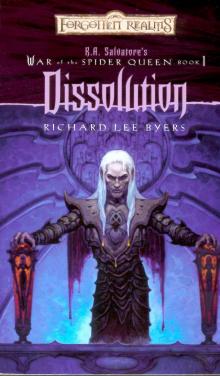 Dissolution
Dissolution Arkham Horror- Ire of the Void
Arkham Horror- Ire of the Void The Haunted Lands: Book II - Undead
The Haunted Lands: Book II - Undead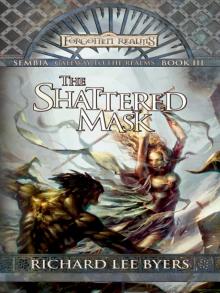 The Shattered Mask
The Shattered Mask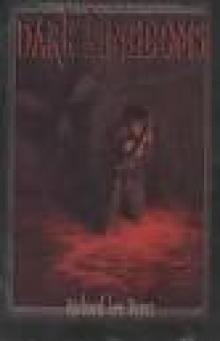 Dark Kingdoms
Dark Kingdoms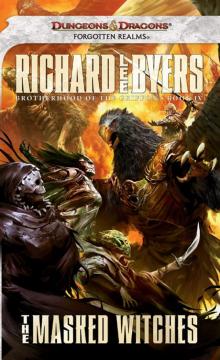 The Masked Witches: Brotherhood of the Griffon, Book IV
The Masked Witches: Brotherhood of the Griffon, Book IV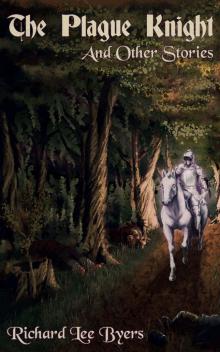 The Plague Knight and Other Stories
The Plague Knight and Other Stories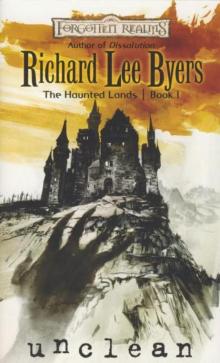 Unclean: The Haunted Lands
Unclean: The Haunted Lands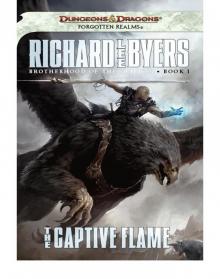 The Captive Flame: Brotherhood of the Griffon • Book 1
The Captive Flame: Brotherhood of the Griffon • Book 1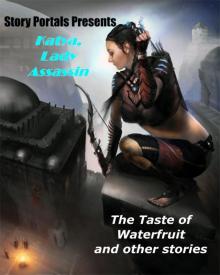 The Taste of Waterfruit and Other Stories (Story Portals)
The Taste of Waterfruit and Other Stories (Story Portals)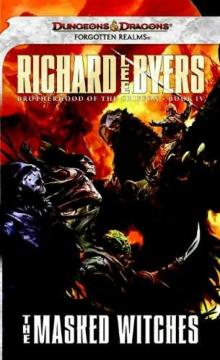 The masked witches botg-4
The masked witches botg-4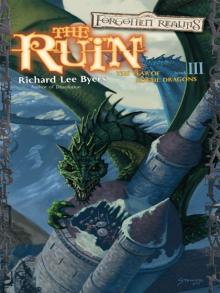 The Ruin
The Ruin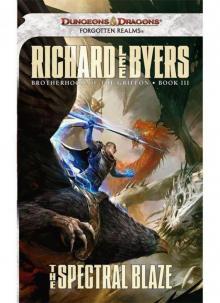 The Spectral Blaze botg-3
The Spectral Blaze botg-3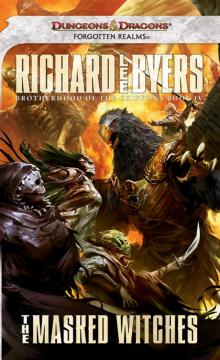 The Masked Witches
The Masked Witches Blind God's bluff bf-1
Blind God's bluff bf-1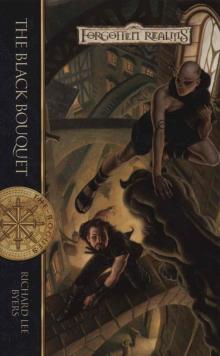 The Black Bouquet r-2
The Black Bouquet r-2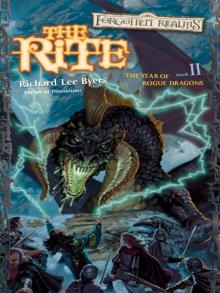 The Rite
The Rite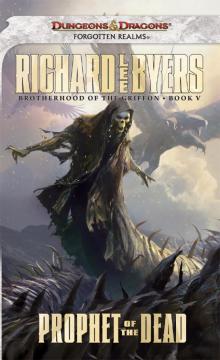 Prophet of the Dead: Forgotten Realms
Prophet of the Dead: Forgotten Realms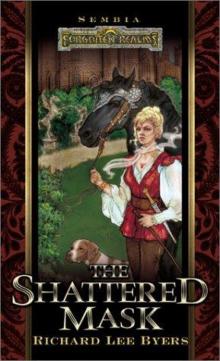 The Shattered Mask s-3
The Shattered Mask s-3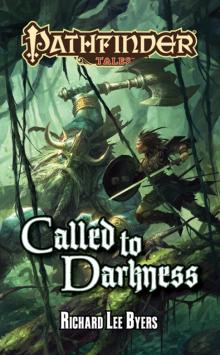 Called to Darkness
Called to Darkness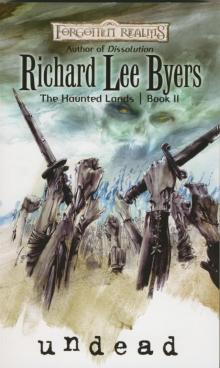 Undead hl-2
Undead hl-2 Blind God's Bluff: A Billy Fox Novel
Blind God's Bluff: A Billy Fox Novel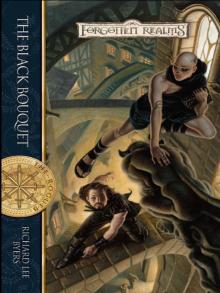 The Black Bouquet
The Black Bouquet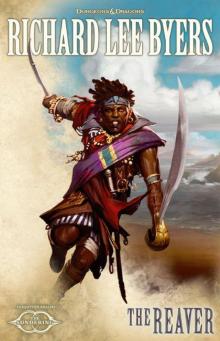 The Reaver
The Reaver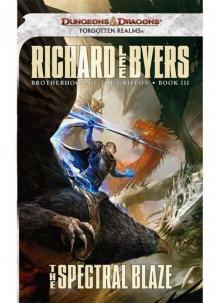 The Spectral Blaze: A Forgotten Realms Novel
The Spectral Blaze: A Forgotten Realms Novel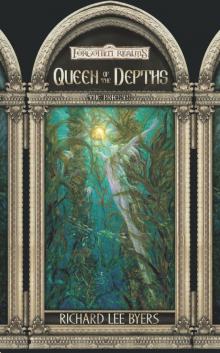 Queen of the Depths
Queen of the Depths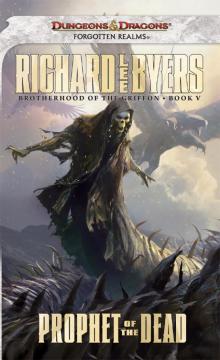 Prophet of the Dead botg-5
Prophet of the Dead botg-5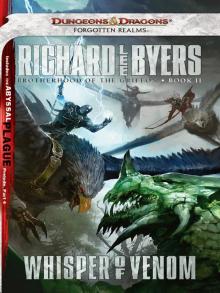 Whisper of Venom: Brotherhood of the Griffon, Book II
Whisper of Venom: Brotherhood of the Griffon, Book II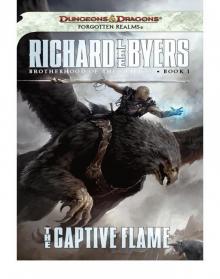 The Captive Flame botg-1
The Captive Flame botg-1 The Haunted Lands: Book III - Unholy
The Haunted Lands: Book III - Unholy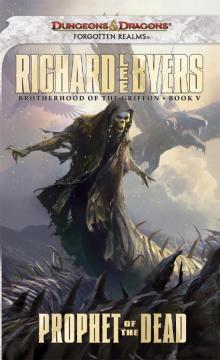 Prophet of the Dead
Prophet of the Dead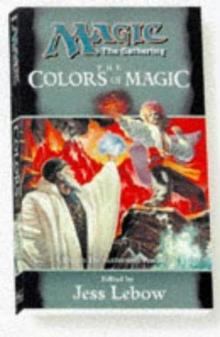 The Colors of Magic Anthology (magic: the gathering)
The Colors of Magic Anthology (magic: the gathering)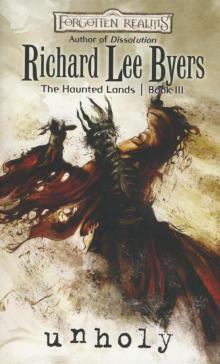 Unholy hl-3
Unholy hl-3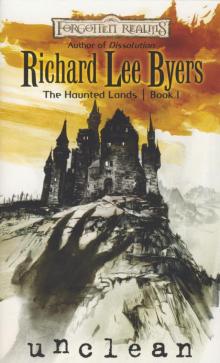 Unclean hl-1
Unclean hl-1 Blind God's Bluff
Blind God's Bluff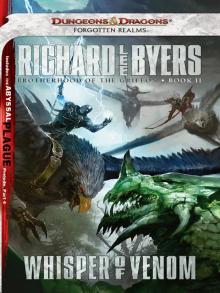 Whisper of Venom botg-2
Whisper of Venom botg-2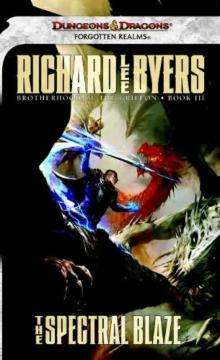 The Spectral Blaze
The Spectral Blaze